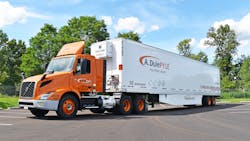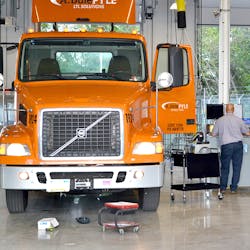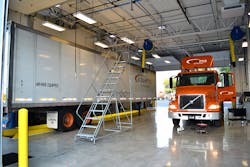A. Duie Pyle’s maintenance key to award-winning safety operations
All fleets say they put safety first, but only three each year can win the American Trucking Associations’ President’s Trophy, which recognizes the fleets with the ultimate commitment to highway safety. And for the fifth time, A. Duie Pyle proved they prioritize safety by earning the trophy for the mid-level category.
Categories are broken down by miles driven: under 25 million, 25 million to 100 million, and over 100 million. Winners are selected by judges comprising fleet safety experts and commercial vehicle enforcement personnel, after placing in the top three in their category in the ATA Truck and Industrial Safety Contest. Fortune Transportation, based out of Windom, Minnesota, won the Under 25 trophy and FedEx Freight earned the honors for the "over 100 million mile" segment.
Last year, the West Chester, Pennsylvania-based fleet drove 83 million miles. Pyle runs 1,500 trucks—Freightliner, Peterbilt, and Volvo—with 3,000 trailers, largely running LTL operations in the Northeast.
“The ATA President’s Trophy is one of the most coveted in the industry and recognizes a motor carrier’s outstanding commitment to highway safety industry wide,” said Jacob Pierce, executive director of the ATA Safety Management Council. “A. Duie Pyle goes above and beyond to promote safety and is respected by all in the trucking industry for their dedication to operating at the highest level.”
Team effort
“What makes this such a prestigious national award is the comprehensive judging process and its recognition of the efforts of the entire Pyle team,” said Peter Dannecker, VP of risk and integrated resources at Pyle. “The President’s Trophy can only be earned when everyone at the company embraces safety and contributes to the result.”
Drivers and their training play a big part in operating safely at a high level, but a fleet’s maintenance practices should not be discounted. Even the best driver can’t compensate for poorly maintained brakes or tires. And Pyle makes sure its maintenance department practices what the fleet preaches.
“It's an ongoing philosophy or culture here at Pyle,” said Dan Carrano, Pyle’s VP of maintenance. “We try to do the right thing for the right reasons. And in fleet maintenance, we try to maintain the trucks to ‘like-new’ specifications.”
The other component is setting the right tone day one by instilling that safety culture during technician onboarding, such as the specific procedures for wheel installations. Improperly torqued wheel fasteners can lead to deadly consequences via wheel-off events.
“We're pretty much a process-oriented company, and believe that safety is contagious,” Carrano added. “Once you instill those processes of safety, whether it's through points of contact, getting in and out of a vehicle, or wearing gloves where needed, it just becomes part of your daily routine—you almost do it unconsciously.”
Another critical process is the implementation of post-preventive maintenance inspections.
“They're done on a random basis to ensure that the fleet technicians are following the processes that are in place,” Carrano said. “Good results are praised, and a negative result is a coaching opportunity."
These may include loose clamps, low fluid levels, or an improperly torqued bolt.
“We also perform monthly safety inspections of the shop and the tooling used to ensure best safety practices are at the forefront of everyone’s mindset,” said Mike Downey, a Pyle shop supervisor. “Focusing on the fundamentals and infrastructure of keeping a clean, organized and well-lighted, shop is key to promoting a strong safety culture.”
ADAS
Pyle was also an early adopter of collision mitigation systems, fitting their trucks with the technology since 2011. They deploy Bendix Wingman Fusion on the Peterbilt Model 579s, Volvo Active Driver Assist (VADA) on the Volvo VNRs, and Detroit Assurance on the Freightliner Cascadias.
“All three tractors have collision mitigation and lane-departure warning, as well as adaptive cruise control,” Carrano noted.
Maintaining one safety system, let alone three, is difficult enough, so Carrano made it a point in 2012 to have the smaller shops handle specific truck brands, while the large ones are mixed fleet. This has also allowed for reduced inventory at each maintenance site. There are 21 shops in all, located at the LTL facilities, with 150 technicians on staff. There are four locations without dedicated service areas.
Tires
Your fleet can't stay safe on the roads with a shoddy tire program, and Pyle's strategy of exclusively using tier-one tires seems to be paying off.
“We're not substituting the tires that came on the truck when it was brand new with a lesser quality tire,” Carrano said.
Pyle does factor in rolling resistance for fuel savings, but the top priority is traction. Their primary tire OE is Michelin, which Carrano said was based on performance as well as the all-around service.
“With any tire, it's how you manage your tire program that is key,” he explained. “You can buy the best tire in the world, and if you don't manage the tire program, it will have its downsides.”
Pyle manually monitors tire pressure and depth, as opposed to relying on a tire pressure monitoring system, but does fit the trailers with the Meritor Tire Inflation System by P.S.I.
“Everyone's trying to skin that cat many different ways in my eyes,” Carrano said of the many digital tire monitoring systems. “Let's just start off with good visual inspections and air pressure checks, but on a trailer tire, I believe that the P.S.I. system is a good tool in the toolbox.”
Brakes
Pyle has exclusively used air disc brakes on its tractors since 2011, while sticking with drum brakes on trailers. Carrano said they stick with Bendix solely for all the components, from calipers to rotors to pad sets.
Pyle’s safety mindset calls for “an aggressive replacement strategy” and never pushing brakes to the limit, Carrano noted.
“Our brake replacement spec is really designed so that it can ensure that the truck will make it to the next PM without needing a brake job in between,” he said. “That lessens the amount of time you have to bring that piece of equipment out of service and into the shop.”
Training
William Thomas, fleet maintenance manager at the West Chester site, said training is the fleet’s number one safety tool.
Employees also watch safety videos every month and interact with leadership daily to reinforce the safety culture.
“No unsafe practice or short cut is acceptable. Daily, shops are required to complete shift inspections which minimize hazards as well,” Thomas added.
This ranges from teaching technicians to always wear all necessary personal protective equipment, when needed, to understanding how to accurately use diagnostics equipment.
Failing to do either may result in an accident. Not wearing protective gear near a parts washer could cause immediate harm, while screwing up a diagnosis can result in improper parts installs or repairs and impact vehicle safety, Thomas noted.
“Protect yourself, protect your coworkers, and be responsible—it could save a life,” Thomas asserted. “We all want to leave work the way we came.”
About the Author

John Hitch
Editor-in-chief, Fleet Maintenance
John Hitch is the award-winning editor-in-chief of Fleet Maintenance, where his mission is to provide maintenance leaders and technicians with the the latest information on tools, strategies, and best practices to keep their fleets' commercial vehicles moving.
He is based out of Cleveland, Ohio, and has worked in the B2B journalism space for more than a decade. Hitch was previously senior editor for FleetOwner and before that was technology editor for IndustryWeek and and managing editor of New Equipment Digest.
Hitch graduated from Kent State University and was editor of the student magazine The Burr in 2009.
The former sonar technician served honorably aboard the fast-attack submarine USS Oklahoma City (SSN-723), where he participated in counter-drug ops, an under-ice expedition, and other missions he's not allowed to talk about for several more decades.


